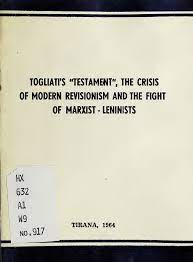Discussion on Abortion rights in Socialist Albania
 |
| Children's hospital in Albania, 1967 |
Discussion on Abortion rights in Socialist Albania
From "Albanian Life" No 25; No. 2, 1983
__________
Letter to the Editorial Committee of the "Albanian Life"
From: Margaret Arkwright, London NW3
As a feminist who
has long admired the achievements of Albania – not least in its efforts to
bring about the emancipation of women I was shocked to gather from the story
"A Woman's Heart", published in the last issue of ALBANIAN LIFE, that
abortion on demand is not legal in that country.
This places
Socialist Albania behind many capitalist countries, where the right of a woman
to control her own body is recognised in law - places its official stand on
this question in line with that of the Catholic Church.
A foetus is in no way a rational, self-conscious human being, and to equate abortion with murder is clearly absurd. Furthermore it has long been established that laws prohibiting abortion on demand merely drive women to back-street abortionists, all the dangers to health which this entails. which this entails.
__________
The Editorial Committee Replies:
Albanian society
is not based on the principle of maximising individual freedom irrespective of
its effects on other human beings and on society as a whole. Ethics – the
science of right and wrong in conduct – is seen as based on the interests of
society.
It is, of course,
true that a foetus is not "a rational, self-conscious human being".
Neither is a young baby, but few feminists uphold the right of a parent to kill
a baby "on demand".
As we understand
it, the Albanian authorities see a zygote (a fertilised ovum), an embryo and a
foetus as living organisms of the species Homosapiens; like a child, they
represent a living human being at different stages of incomplete development.
Birth is not, therefore, regarded as such a significant moral dividing line
that the killing of a baby after birth is legitimate, while the killing of an
unborn baby is legitimate. After all, a prematurely-born baby may be much less
developed than a foetus at term.
In slaveowning
society, a slave was regarded as the property of the slaveowner, who had the
legal right to have the slave killed "on demand". Socialist Albania
does not recognise such property rights over other human beings, whether fully
or incompletely developed.
Certainly in
capitalist societies it is impossible, for economic reasons inherent in the
system, for many citizens to find work. Here, therefore, the birth of a large
number of babies to the working class is regarded as "dangerous to the
stability of society", and Malthusian sociologists refer constantly to the
perils of "the population explosion". In Socialist Albania, however,
where the right to work is guaranteed by the Constitution, every baby born
represents a future worker who will increase the material and cultural life of
society, a future soldier who can defend it and its achievements. Thus, in
Albania the fact that the country has the highest birth-rate in Europe is a matter
for rejoicing.
As Albanian
sociologists see it, therefore, the demand for abortion on demand reflects the
social conditions of a capitalist society, and is inappropriate for a socialist
society. This demand, they assert, is based on the fact that, under capitalism,
the negative features of pregnancy, childbirth and child-rearing may, in the
eyes of the woman involved, outweigh in many cases the positive features. A
socialist society, however, works to eliminate these negative features by the
provision of paid pregnancy and maternity leave, of ample cheap housing (rents
in Albania are equivalent to 3% of earnings), of creche and day nursery
facilities for all. Its encouragement of the active role of the father in
housework and child-care, and of the extended family, is also a factor in
reducing the negative factors which may be associated with the birth of a
child.
Regarding
abortion on demand as unethical in a socialist society, therefore, the Albanian
authorities reject the argument that the negative factors which may be
associated with the birth of child bring about, in a socialist society, the
despair which leads to the activity of backstreet abortionists.
Finally, Ms.
Arkwright is incorrect in comparing the position of the Albanian authorities on
abortion with that of the Catholic Church. The latter forbids abortion in all
circumstances, while in Albania abortion is legal and indeed encouraged (as the
story "A Woman's Heart" makes clear) where there are medical reasons
that make it desirable. In other words, where circumstances force a choice
between the health, and perhaps the life, of the mother and the life of the
unborn child, the interests of the fully-developed human being are placed above
those of the less-developed human being – just as, under Albanian penal law, to
kill a man is regarded as ethical and lawful if it is carried out in necessary
self-defence.
_____
https://www.marxists.org/subject/albania/albanian-life/issues/25-02.pdf


Nhận xét
Đăng nhận xét